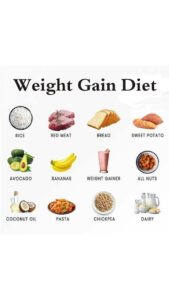Crafting a Healthy Diet Plan for Weight Gain
Gaining weight in a healthy manner is a common goal for many who find themselves struggling to put on pounds. It’s crucial to approach this goal with a plan that focuses on nourishing the body with the right nutrients while ensuring that weight gain is sustainable and beneficial for overall health. Here’s a comprehensive guide to creating a healthy diet plan for weight gain, presented in a unique and original way.

Understanding the Basics
Before diving into specific dietary recommendations, it’s important to grasp the fundamental principles of healthy weight gain. The objective is to increase body mass by adding lean muscle and healthy fat, rather than simply accumulating excess body fat. This requires a careful balance of calorie intake, nutrient-dense foods, and regular physical activity.
Caloric Surplus
The cornerstone of gaining weight is consuming more calories than the body expends. This is known as a caloric surplus. However, the quality of these calories matters significantly. Focus on increasing intake through nutrient-rich foods rather than high-calorie junk foods, which can lead to unhealthy fat gain and other health issues.
Macronutrient Breakdown
1.Proteins Proteins are vital for muscle repair and growth. Incorporate a variety of protein sources into your diet, such as lean meats (chicken, turkey, beef), fish, eggs, dairy products, legumes (beans, lentils), and nuts. Aim for at least 1.2 to 2.0 grams of protein per kilogram of body weight daily.
2. Carbohydrates: Carbs are a primary source of energy and should be a significant part of your diet. Opt for complex carbohydrates like whole grains (brown rice, oats, quinoa), starchy vegetables (sweet potatoes, squash), and fruits. These provide sustained energy and essential nutrients.
3. Fats Healthy fats support hormone production and overall health. Include sources of unsaturated fats such as avocados, nuts, seeds, and olive oil. Omega-3 fatty acids found in fish like salmon and mackerel are also beneficial.
Meal Frequency and Portions
Eating more frequently can help increase calorie intake without overwhelming your digestive system. Aim for five to six smaller meals throughout the day rather than three large ones. Each meal should be balanced with proteins, carbs, and fats to ensure adequate nutrition.
Sample Meal Plan
Here’s a sample daily meal plan to illustrate how to balance these components:
– Breakfast Greek yogurt topped with granola, mixed berries, and a drizzle of honey. Add a handful of nuts or seeds for extra protein and healthy fats.
– Mid-Morning Snack: A smoothie made with banana, spinach, protein powder, almond milk, and a spoonful of peanut butter.
– Lunch: Grilled chicken breast with quinoa, steamed broccoli, and a side salad dressed with olive oil and vinegar.
– Afternoon Snack: Whole grain toast with avocado and a boiled egg. Alternatively, a handful of mixed nuts and a piece of fruit.
– Dinner: Baked salmon with sweet potato and asparagus. Pair with a whole grain roll or a serving of brown rice.
– Evening Snack: Cottage cheese with pineapple chunks or a small bowl of mixed nuts and dried fruit.
Hydration
Proper hydration supports overall health and can aid in digestion and muscle recovery. Drink plenty of water throughout the day. Adding smoothies or milk to your diet can also contribute to your overall fluid intake and calorie goals.
Supplementation
While whole foods should be the primary source of nutrients, supplements can be beneficial in some cases. Consider consulting with a healthcare provider or nutritionist before starting any supplements. Protein powders, creatine, and omega-3 supplements can be useful additions if needed.
Exercise Considerations
Strength training exercises are crucial for transforming the extra calories into muscle rather than fat. Incorporate resistance training exercises, such as weight lifting or bodyweight exercises, at least three times a week. This will help ensure that the weight gained is lean muscle rather than excess fat.
Monitoring Progress
Track your weight gain progress by regularly measuring your weight and body composition. Adjust your calorie intake and meal plan based on your progress and feedback from your body. If weight gain stalls, you may need to further increase your caloric intake or modify your exercise routine.
Conclusion
A healthy weight gain plan requires a thoughtful approach to eating and exercise. By focusing on nutrient-dense foods, balancing macronutrients, and maintaining a caloric surplus, you can achieve your weight gain goals in a healthy and effective manner. Always consider personal needs and consult with a healthcare professional to tailor the plan to your individual requirements.
https://www.marham.pk/healthblog/best-pakistani-diet-plan-for-weight-gain/